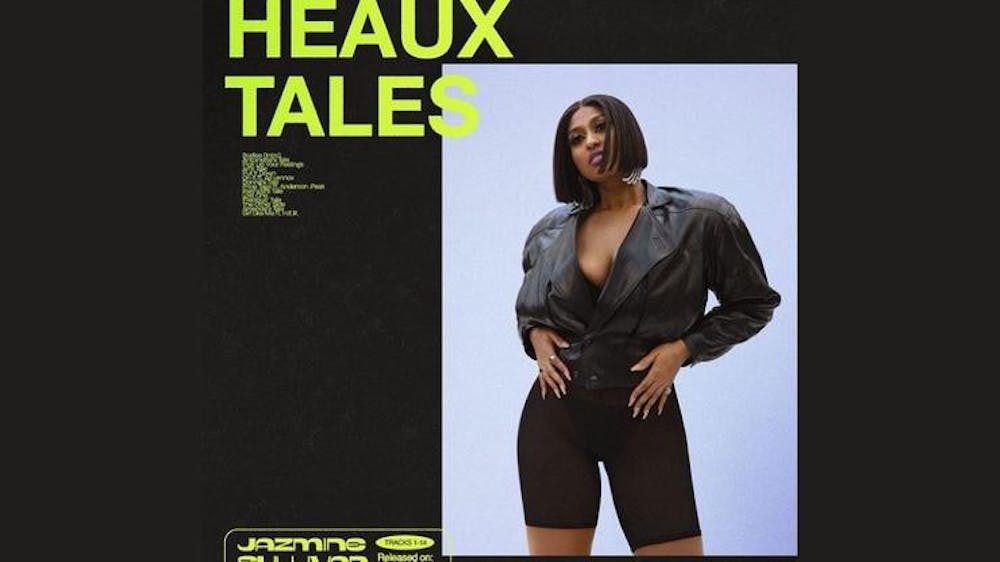Photo by RCA Records
EHREN JOSEPH LAYNE
After a 5-year hiatus, one of Philly’s best Black female vocalists, Jazmine Sullivan, has returned to the R&B/Hip-Hop scene. The release of Jazmine Sullivan’s 2021 album Heaux Tales has been met with critical acclaim, as the album explores love, sex, and power from a female perspective. Jazmine does not bite her tongue on this album: this project is for women, by women. With 8 tracks and 6 interludes, Jazmine constructs a rollercoaster ride of emotionality representative of the emotional distress Black women suffer from. Heaux Tales is a reminder to women that their stories matter, and with Jazmine’s fierce vocal delivery, lyrical wit, and depth-defying arrangements, women's’ stories are presented in an intoxicatingly alluring fashion. There is no doubt in my mind that, after being nominated for twelve Grammys, Jazmine will take home the gilded gramophone in 2021.
Bodies is the intro to Heaux Tales and it is two minutes of absolute hangover gospel. Jazmine doesn’t know where she’s woke up, what she had in her cup, or who she just, you know, and she decides to preach about it. I can’t even begin to describe the vocal dexterity Jazmine performs in this ballad; I can best describe it as graceful. Jazmine effortlessly climbs up and down her vocal ladder while rebounding between rap and gospel cadences. The background vocals are smooth and salient; with the song having little instrumentation, these background vocals acted as both rhythm and harmony throughout the song. "Bodies" is such a well-arranged and blissful song - it grabbed me and pulled me into the album instantaneously. Jazmine wastes no time displaying her vast vocal capabilities and preaching to listeners, for "Bodies" is one of the most beautiful hangover songs I’ve ever heard. Succeeding "Bodies" is "Antoinette’s Tale" (one of the 6 interludes) which leads into the most popular song on the album, "Pick Up Your Feelings." Again and again Jazmine delivers unreal vocal performances on Heaux Tales, but her performance on "Pick Up Your Feelings" is something out of this world. She runs during the whole song and each run outdoes the last - it is uncommon for an artist to present that much vocal creativity in one song. Yet Jazmine does. "Bodies" and "Pick Up Your Feelings" are two of Jazmine’s strongest performances on the album (with "On It" and "Girl Like Me" in contention) with two of the better arrangements. Even with this, we have yet to discuss the true heart of this album: its message.
Each song reacts to the interlude that precedes it. Although many listeners skip interludes, it is in the listeners best interest to take the time to absorb the stories being told in each on Heaux Tales. These stories are what Jazmine exalts, discusses, and examines throughout the album, pitting music against its predecessor: the story. Take "Precious’ Tale," an argument for why women desire rich and well endowed men. More than the security that comes with dating a rich man, Black women believe they are owed something for their hard work and pain. Black women exist at the lower echelons of all male-dominated societies, and even when women inspire, create, and champion so many positives in this world, their work is met with strife and indifference. Black women aren’t dating rich men solely for themselves, but for the reparations owed to them and their sisters. Many men would hear an argument like this and cower: they wouldn’t be able to accept their relationships as a form of repayment. Though I sympathize with that sentiment, Black women don’t have the luxury of viewing their relationships differently. If a Black woman dates the men she likes, and they happen to be many, she is labeled a heaux. If a Black woman doesn’t date, she’s ridiculed for not doing “her job” which is to procreate and nurture. If a Black woman dates rich men, she’s labeled a gold-digger, but at least she’s in a place financially where she can do more good for herself and her sisters. "Amanda’s Tale" tells a rather poignant story of how sex is both empowering for women and deeply shameful and saddening. Women should feel confident in their ability to keep a man, but those same men only value one thing: sex. If sex is all that men value, then women feel as if sex is all that they have to offer - it’s all that women are worth. Although men may push back on this idea, there exist too many examples of powerful men using sex as a tool to control women's’ sense of self-worth. Toxically masculine behavior like this is why Jazmine felt the need to release this album; Heaux Tales is arranged in such a way that not only are you absorbing such beautiful sounds and musical progressions, but you’re also absorbing these messages of pain and hurt from Black women.
All things considered, Heaux Tales was a masterfully produced and arranged album, one I hope passes the test of time. If you haven’t listened to the album, I implore you to at least listen to "Bodies," and hopefully you’ll be roped in the same way I was. I can’t thank Jazmine enough for showing me, a Black man, the consequences of my toxic masculine traits, and providing me with a narrative that I hope to use to better my relationships.



